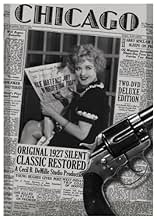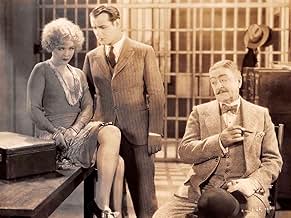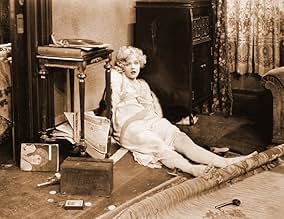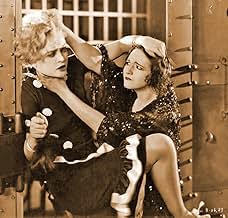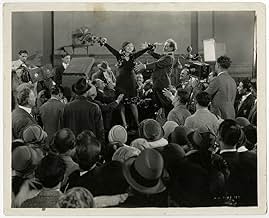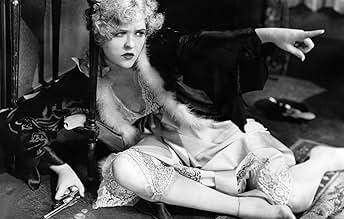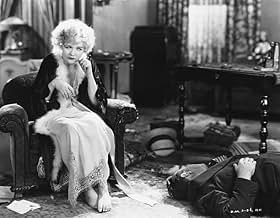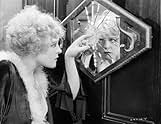A wild jazz-loving and boozing wife Roxie Hart kills her boyfriend in cold blood after he leaves her.A wild jazz-loving and boozing wife Roxie Hart kills her boyfriend in cold blood after he leaves her.A wild jazz-loving and boozing wife Roxie Hart kills her boyfriend in cold blood after he leaves her.
- Awards
- 2 wins
Emily Barrye
- Woman in Cell Reading Book
- (uncredited)
Sidney Bracey
- Bill Collector
- (uncredited)
Robert Brower
- Juror
- (uncredited)
Sidney D'Albrook
- Photographer
- (uncredited)
Jack Dean
- Assistant Prosecutor
- (uncredited)
Robert Dudley
- Insurance Agent
- (uncredited)
Jim Farley
- Detective
- (uncredited)
- Director
- Writers
- All cast & crew
- Production, box office & more at IMDbPro
Storyline
Did you know
- TriviaAlthough Frank Urson is credited as the director, it was widely known (and even publicized) at the time that producer Cecil B. DeMille directed most of the film (including 11 days of re-takes). DeMille took his name off the picture because his Biblical epic, The King of Kings (1927) was also playing in theaters at the time. Reportedly, DeMille's friend, theater owner Sid Grauman, convinced the director that audiences wouldn't want to see an amoral crime drama with an adulterous heroine so soon after seeing DeMille's film about the life of Christ.
- Quotes
William Flynn: Cut the bull! I'm not your husband - I'm your lawyer!
- ConnectionsFeatured in The 79th Annual Academy Awards (2007)
Featured review
CHICAGO (1927) is the story of Roxie Hart (Phyllis Haver), a bored young housewife who kills her lover during an argument. She convinces her doting husband Amos (Victor Varconi) that she killed the man in self- defense. Amos goes to great lengths to save her from the noose, hiring oily lawyer William Flynn (Robert Edeson). Meanwhile, a slick reporter (T Roy Barnes) plays up her beauty and "innocence", making her into a nationwide celebrity. Direction is credited to Frank Urson, but in actuality Cecil B DeMille directed the majority of the film.
CHICAGO is an adaptation of a play by author Maurine Watkins, which was inspired by Watkins' own articles about the trial of real-life murderess Beulah Annan. The film is tight and well crafted. In particular, it's a sharp and merciless satire on unearned celebrity, societal double standards, and the hedonistic 1920s lifestyle. There are many laugh-out- loud hilarious scenes, including a scene where Flynn coaches Roxie on how to appear during his closing statement to the jury, and a scene of the photographer posing Roxie shortly after the murder takes place. Many scenes use exaggeration to make points about media sensationalism and lawyers' appeals to emotion, rather than truth, in order to exonerate their guilty clients. The humor is balanced by the dramatic portrayal of Amos' efforts to save his undeserving wife from the noose. Amos is the moral center of the movie, a decent man who is so in love with his wife that he is willing to break the law to save her, yet struggles with her murderous deed and self-centered, callous attitude.
The acting in CHICAGO is nothing less than excellent. Phyllis Haver makes a great lead, portraying the many facets of Roxie Hart's character skillfully. She shows equal comedic and dramatic ability. One could argue that Roxie is a sociopath, able to turn on the charm and the waterworks at will in order to get her way, but fundamentally lacking a conscience. Haver's portrayal of Roxie is perfect. I had never heard of Victor Varconi before, but he played Amos with great skill, sensitivity and restraint, turning in a very believable performance. The rest of the cast does fine work as well.
Visually, CHICAGO is top-notch, with skillful editing, fluid camera work, and meaningful use of visual cues. One instance of this is a shot of a crowd walking heedlessly on a newspaper with Roxie on the front page once her 15 minutes of fame are up. The visual style of the film points the way forward to the classic Hollywood style of the 1930s and 40s. This film came out the same year as landmark movies like SUNRISE, WINGS, and METROPOLIS, and even though it is not as celebrated as those visual marvels, in its way it's just as accomplished.
SUMMARY: CHICAGO is a skillful blend of satire and drama that boasts a razor-sharp script, excellent performances, and highly accomplished direction. The message of the movie has just as much resonance now as it did in its time. A classic! SCORE: 10/10.
CHICAGO is an adaptation of a play by author Maurine Watkins, which was inspired by Watkins' own articles about the trial of real-life murderess Beulah Annan. The film is tight and well crafted. In particular, it's a sharp and merciless satire on unearned celebrity, societal double standards, and the hedonistic 1920s lifestyle. There are many laugh-out- loud hilarious scenes, including a scene where Flynn coaches Roxie on how to appear during his closing statement to the jury, and a scene of the photographer posing Roxie shortly after the murder takes place. Many scenes use exaggeration to make points about media sensationalism and lawyers' appeals to emotion, rather than truth, in order to exonerate their guilty clients. The humor is balanced by the dramatic portrayal of Amos' efforts to save his undeserving wife from the noose. Amos is the moral center of the movie, a decent man who is so in love with his wife that he is willing to break the law to save her, yet struggles with her murderous deed and self-centered, callous attitude.
The acting in CHICAGO is nothing less than excellent. Phyllis Haver makes a great lead, portraying the many facets of Roxie Hart's character skillfully. She shows equal comedic and dramatic ability. One could argue that Roxie is a sociopath, able to turn on the charm and the waterworks at will in order to get her way, but fundamentally lacking a conscience. Haver's portrayal of Roxie is perfect. I had never heard of Victor Varconi before, but he played Amos with great skill, sensitivity and restraint, turning in a very believable performance. The rest of the cast does fine work as well.
Visually, CHICAGO is top-notch, with skillful editing, fluid camera work, and meaningful use of visual cues. One instance of this is a shot of a crowd walking heedlessly on a newspaper with Roxie on the front page once her 15 minutes of fame are up. The visual style of the film points the way forward to the classic Hollywood style of the 1930s and 40s. This film came out the same year as landmark movies like SUNRISE, WINGS, and METROPOLIS, and even though it is not as celebrated as those visual marvels, in its way it's just as accomplished.
SUMMARY: CHICAGO is a skillful blend of satire and drama that boasts a razor-sharp script, excellent performances, and highly accomplished direction. The message of the movie has just as much resonance now as it did in its time. A classic! SCORE: 10/10.
- How long is Chicago?Powered by Alexa
Details
Box office
- Budget
- $264,397 (estimated)
- Runtime1 hour 45 minutes
- Sound mix
- Aspect ratio
- 1.33 : 1
Contribute to this page
Suggest an edit or add missing content


